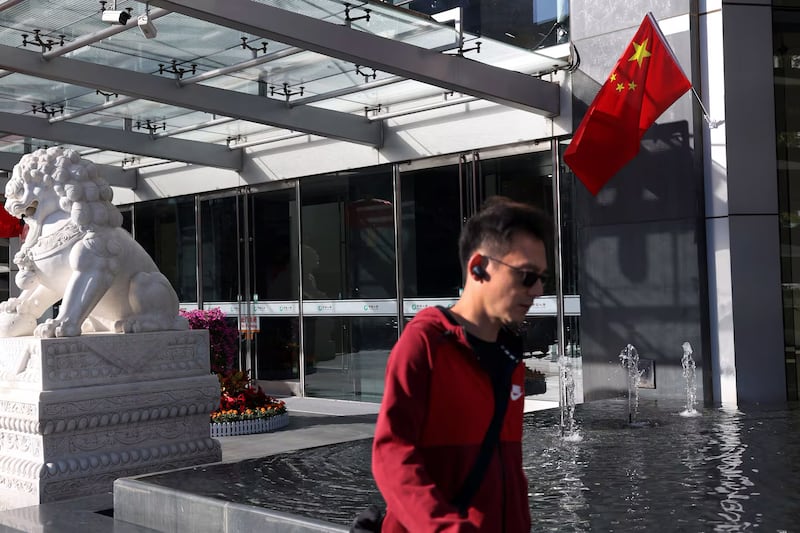China has said it will take steps to “stabilize” foreign investment amid plummeting investment inflows in recent years, but analysts say the measures announced Monday by Premier Li Qiang are unlikely to result in genuine policy changes.
Li told State Council executive meeting on Monday that “foreign enterprises play an important role in job creation, export stabilization and industrial upgrading,” state news agency Xinhua reported.
Foreign direct investment in China has weakened since the end of COVID-19 restrictions, and has been flagged as a key factor in Beijing’s push to kick-start flagging economic growth.
Li called for “more practical, effective measures to stabilize existing foreign investment and expand new investment,” the Xinhua report said.
The meeting called for a pilot program opening up the service sector to foreign investors and “encouraged foreign capital to undertake equity investment in China,” the agency reported.
Inbound foreign direct investment, or FDI, fell by 13.7% in 2023 to US$163 billion, according to statistics from the Ministry of Commerce, although the country remained the number four destination for investors in the world, according to the International Monetary Fund.
Investor confidence has been hit by “slower-than-expected economic recovery following COVID-19, lower prospects for long-term growth, capital controls, lack of policy predictability and regulatory transparency, and tensions in the U.S.-China relationship,” according to the U.S. State Department’s 2024 Investment Climate Statement.
The State Council meeting called for “domestic and foreign enterprises to be treated equally in government procurement, as well as the need to broaden financing channels for foreign enterprises,” Xinhua reported.
China is the 11th most restrictive economy out of 89 countries surveyed by the Organization for Economic Cooperation and Development, a ranking that reflects “longstanding prohibitions on investment in key sectors and unpredictable regulatory enforcement,” according to the State Department report.
“Obstacles include foreign ownership caps, requirements to form joint venture (JV) partnerships with local firms, industrial policies to develop indigenous capacity or technological self-sufficiency, licensing tied to localization requirements, and pressures to transfer technology as a prerequisite for gaining market access,” the report said.
‘Meetings are just slogans’
Analysts said Li will have a hard time turning that around, especially as President Xi Jinping has the last word on economic policy.
“All of Li Qiang’s State Council meetings are just slogans, because he’s not allowed to make changes to the broader policies laid down by Xi Jinping,” current affairs commentator Zheng Xuguang told RFA Mandarin in a recent interview.
RELATED STORIES
China’s ill-defined spy law dampens foreign investor confidence
Number of Japanese living in China falls to lowest in 20 years
Foreigners still visiting China, but fewer want to live there
He said Xi seems resistant to calls for him to relinquish top-down control of the economy, as late supreme leader Deng Xiaoping did from 1979, unleashing decades of breakneck economic growth.
“No one is even thinking about that now, and Xi Jinping seems to lack determination when it comes to solving [the problem of openness to foreign investment],” Zheng said.
Wang En-kuo, honorary president of the Taiwanese Business Association in the eastern city of Nanchang, said tariffs on exports to the United States are a major factor in turning away foreign investors from China.
“Everyone knows that these are just declarations, that won’t have any real effect,” Wang told RFA Mandarin in a recent interview. “That’s because China’s fundamental problems haven’t been solved.”
“For foreign-invested enterprises that produce in China for export, tariffs are the biggest consideration,” Wang said. “Export-oriented foreign investment will certainly consider looking for other locations where tariffs or production costs can be reduced.”
Even foreign-invested enterprises focused on the domestic Chinese market are facing severe competition from Chinese companies.
“If they can’t make a profit, they’ll have to leave,” Wang said.
Other destinations
And it’s not just foreign companies that are leaving.
South Korea’s Ministry of Trade, Industry and Energy has said Chinese companies are currently setting up in South Korea at the rate of one a day, according to a Feb. 10 report by BusinessKorea.

It cited the example of a semiconductor and display manufacturing company in Daejeon that was acquired by a Chinese company last year. While most of the company’s employees are still Korean, more than 90% of the shares are now controlled by Chinese capital, the report said, suggesting it was a form of “identity laundering” aimed at circumventing U.S. tariffs on Chinese-made goods.
According to Wang, the most popular destination for Chinese companies looking to relocate is currently Vietnam.
“Chinese exports to Vietnam grew by more than 25% year-on-year in the first three quarters of 2024, and almost all of [the orders] were from Chinese companies,” Wang said.
“The Chinese government is not worried about the departure of local companies, because even if these companies move abroad, they will still import raw materials from China.”
Zheng said Chinese companies have been relocating their production facilities, while still importing raw materials and spare parts from China.
“Companies may be able to avoid the 10% tariff by relocating to other countries, as [U.S. President] Trump’s tariffs haven’t hit those places yet,” he said. “But Trump’s policy is very clear: tariffs will be imposed on all countries.”
He said Vietnam is a salient example.
“Exports from Vietnam and Mexico have increased significantly, which is actually the effect of Chinese companies moving there,” Zheng said. “If Trump imposes tariffs across the board, then it’ll be pointless to relocate production facilities.”
China’s General Administration of Customs has said that Chinese exports to Vietnam will grow by nearly 18% in 2024 to a record high of US$162 billion, Bloomberg reported, while exports to Japan totaled US$152 billion during the same period.
Translated by Luisetta Mudie. Edited by Roseanne Gerin.
